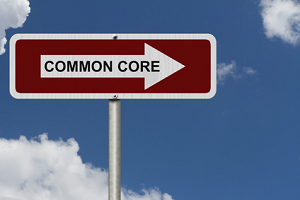
Politics
Many of the crises and issues discussed below need a solution. However, our political system, from city councils to the state legislatures to the federal government, solutions are paralyzed by intractable, partisan gridlock. Politicians from both parties seem more interested in being right and placing blame on the other party. Democrats are fixated on more funding for schools, and while that would help, the education system needs reform, not just money. Republicans are intent on demonizing teacher unions, and ignore the reality that education reform encompasses a wide array of challenges, not just teacher benefits.
Common Core State Standards
The federal government introduced Common Core State Standards in 2010, and encouraged states to adopt it by providing federal grants to those states that agreed to enroll. The standards focus on improving basic English language and math skills. To date 46 states have enrolled, but progress has been mixed.
Nevertheless, the standards are an attempt to address the sad reality that American students fare poorly when compared to European and Asian students. Most criticism of the standards cite a “one-size-fits all” approach. This is valid criticism. Hopefully, the federal government can continue work on the standards, perhaps making them a bit more flexible. However, there is much resistance to the standards by Republicans, many of whom claim standards to be the federalization of K-12 education. Perhaps there’s some truth to that, but the real question is, where have the states been these last 30 years while the system deteriorated?
Technology
New technology, from notebooks for every student to online learning, plays a role in education, and can be very helpful in testing and improving skills. However, it also exacerbates the issue of funding disparities. Schools rich in money can afford tablets and wireless access for all students, while poor schools struggle to keep the schools safe, maintained, and heated during winter. The result is growing inequalities in education opportunities, which poses a challenge nationwide improvement.
School Safety
With numerous recent tragedies where students died, a dedicated focus on school safety is understandable. However, too much security and control can make our schools seem like mini-prisons. In fact, former Attorney General Eric Holder expressed just that concern.
Teaching vs. Learning
Much focus on improving education involves holding teachers accountable for student achievements. Yet, more focus is necessary on improving how students learn, not how teacher educate.
Grading
Over-reliance on grades to assess progress and grade inflation are issues that take up too much of educators’ time. Many educators believe that grades poorly assess progress, yet precious time is squandered on emphasizing them rather than addressing other issues on this list.
Classroom Size
When budgets tighten, classroom sizes expand. While studies show that about 15 students per class is the maximum to ensure a good learning environment for teacher and student, many classrooms are bursting at the seam with more than 30 or 40 students.
Family Environment
While education reform often focuses on test standards, teacher accountability, and classroom size, a far larger factor looms over education reform. That factor is the family environment. What happens at home impacts a student’s ability to learn. While family environment is a broader social issue, how it affects students needs to be considered when discussing reform.
Cheating
There’s no question that student cheating is a problem. The only real question is what is worse: rampant cheating that goes undetected, or the apparently prevailing view among students that cheating’s not really a big deal.
Distractions
The time that school administrators, counselors, and teachers spend with students and students’ issues is precious. And yet, the government and society impose a smothering blanket of political correctness, school lunch nutrition standards, invasive security requirements, and a whole host of other issues that belong in the lawmaking and policymaking areas of government, not in the nations’ schools.
